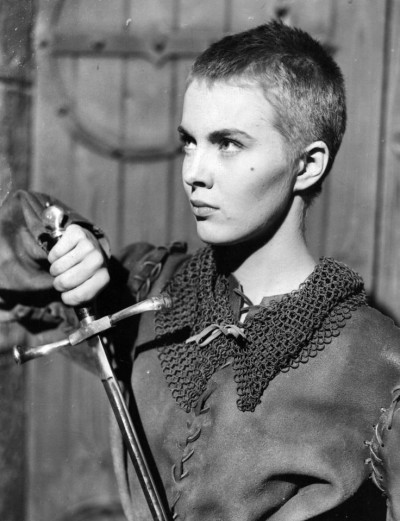★★
“Joan of Inaction”
 An adaptation by noted playwright Graham Green of George Bernard Shaw’s 1924 play, this is most famous for the extensive search undertaken by director Preminger to find the “right” Joan for the job, which involved testing over 18,000 candidates before settling on Seberg. whose only previous acting to that point had been in school plays. That’s in sharp contrast to the experience in the rest of the cast, which included Widmark as Charles, the Dauphin enthroned by Joan’s actions, and Gielgud as the Earl of Warwick, whose schemes lead to the heroine’s death at the stake. But what’s most notable here, in contrast to some of the other versions of the story we’ve written about, Preminger and Greene seem entirely disinterested in the process which brought the Dauphin to the crown. We see Joan’s rise to command, but the film then skips over everything from her approaching the fortress of Orleans, to the coronation of King Charles. In other words: the fun bits.
An adaptation by noted playwright Graham Green of George Bernard Shaw’s 1924 play, this is most famous for the extensive search undertaken by director Preminger to find the “right” Joan for the job, which involved testing over 18,000 candidates before settling on Seberg. whose only previous acting to that point had been in school plays. That’s in sharp contrast to the experience in the rest of the cast, which included Widmark as Charles, the Dauphin enthroned by Joan’s actions, and Gielgud as the Earl of Warwick, whose schemes lead to the heroine’s death at the stake. But what’s most notable here, in contrast to some of the other versions of the story we’ve written about, Preminger and Greene seem entirely disinterested in the process which brought the Dauphin to the crown. We see Joan’s rise to command, but the film then skips over everything from her approaching the fortress of Orleans, to the coronation of King Charles. In other words: the fun bits.
The framing story has Joan as a specter, visiting the aged king, along with the ghost of the Earl and other participants in her life, such as the English soldier who took pity on Joan at the stake and gave her a makeshift cross to hold. The adaptation whacked out, it appears, close to half the running-time of the play, and one had to wonder whether it is any more faithful to the work’s spirit. For in the preface to his work, Shaw explicitly wrote, “Any book about Joan which begins by describing her as a beauty may be at once classed as a romance. Not one of Joan’s comrades, in village, court, or camp, even when they were straining themselves to please the king by praising her, ever claimed that she was pretty.” This is in sharp contrast to Seberg, who even after giving up her long feminine locks for the almost compulsory crew-cut, looks more like Audrey Hepburn’s tomboyish little sister than someone, in Shaw’s words, “unattractive sexually to a degree that seemed to [contemporary writers] miraculous.”
It’s not entirely without merit; some of Shaw’s text still retains its impact, such as Joan’s explanation of why the French are losing: “Our soldiers are always beaten because they are fighting only to save their skins; and the shortest way to save your skin is to run away. Our knights are thinking only of the money they will make in ransoms: it is not kill or be killed with them, but pay or be paid. But I will teach them all to fight that the will of God may be done in France; and then they will drive the poor goddams before them like sheep.” The sheer certainty in Joan’s mind that’s she’s right, and will accept no arguments to the contrary, is impressive. Unfortunately, it’s not enough to sustain the film overall, and you’re left without much insight into either the history, or the personalities who created it.
Dir: Otto Preminger
Star: Jean Seberg, Richard Widmark, Anton Walbrook, John Gielgud




